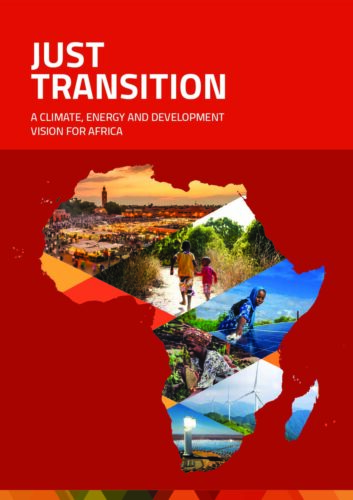PUBLICATION

Just Transition: A Climate, Energy and Development Vision for Africa
Comprehensive report outlining an alternative ('Another development') vision for Africa, building on decades of prior work and initiatives.More info/Summary
In the midst of climate crisis, financial turmoil, pandemics and wars, the world’s economic and geopolitical map is reshaping with risks, uncertainties, and opportunities for Africa. Africa cannot remain passive during this process of structural shifts in the global economy.
This report by independent experts invites all relevant stakeholders – African leaders, government officials and negotiators, civil society, academics, private entities, media, and international partners – to re-envisage a framework for African resilience and prosperity that can simultaneously tackle climate, energy, and development challenges on the continent.
Key messages
- Africa faces numerous intertwined challenges across climate, energy and development
- Africa can choose to formulate another development vision that builds on the rich tradition of African collective, endogenous cultures, breaks dependencies and indebtedness, and fosters enhanced self-reliance
- African countries can succeed with their Just transition if they unite and re-embrace a truly pan-African vision
- Energy and food sovereignty reduce dependence on foreign imports, cater to genuine, basic needs, and build productive capacity
- African societies can set out a new model of value-added industrialisation – with renewable energy technology production to meet domestic needs at the core
- People-centred, smart, renewable energy systems can foster more democratic societies, power thriving local economic development, and lay the ground for social services and social protection for all
- Africa can go from food importer to food sovereignty providing healthy and environmentally friendly food for all while cutting external dependency
- Africa has agency and can invest considerable resources in agroecology, renweable energy, and social protection through their own means and currencies
- Remaining investment needs must be made possible through international support and reparations, in accordance with principles of equity and fair shares
- A just transition requires both rapid and equitable phase out of fossil fuels as well as a renewable energy revolution that does not cause harm to communities or ecosystems
- Africa can inspire questioning of the mainstream development paradigm also on other continents. The set of intertwined, existential crises all societies face calls for a deep reset of the very meaning of ‘development’ and progress, everywhere
- There are no ‘developed’ countries — all societies need to embark on a quest to define new, genuine people-centred and sustainable development

